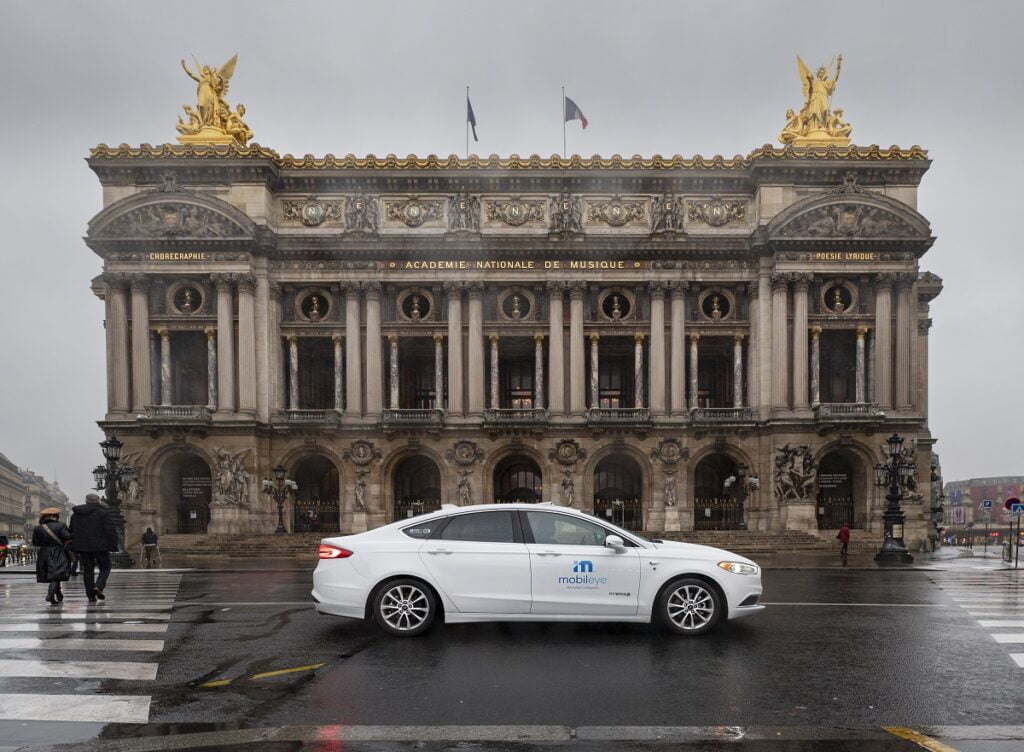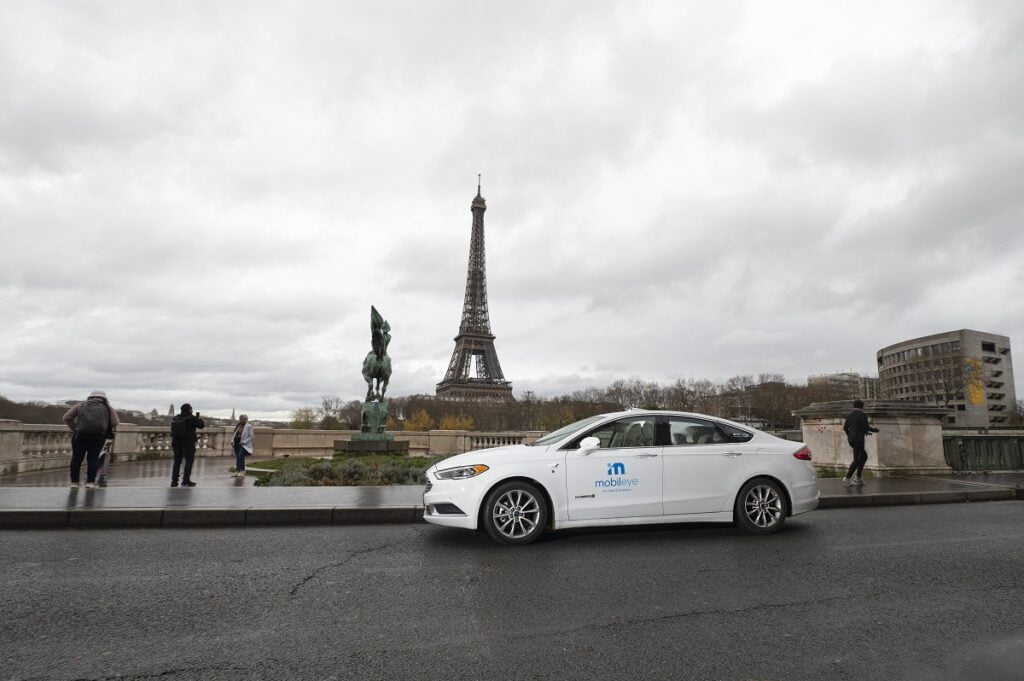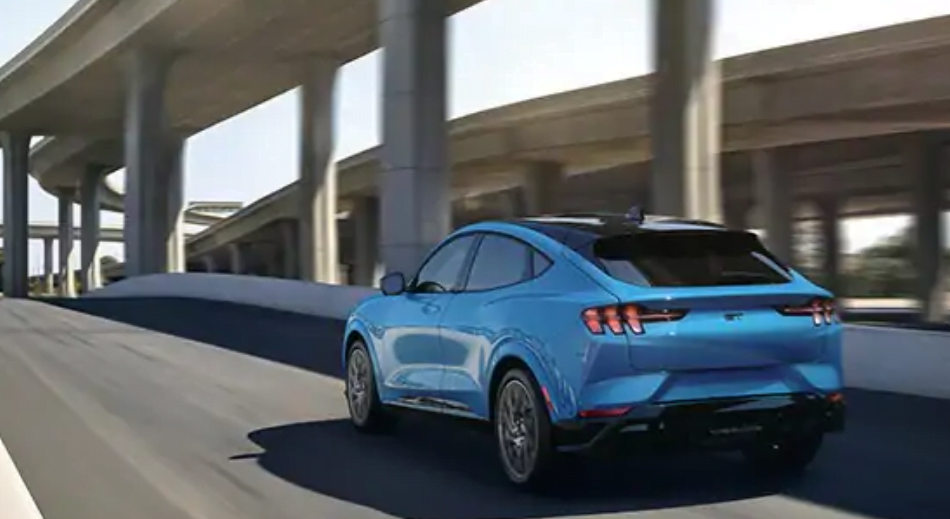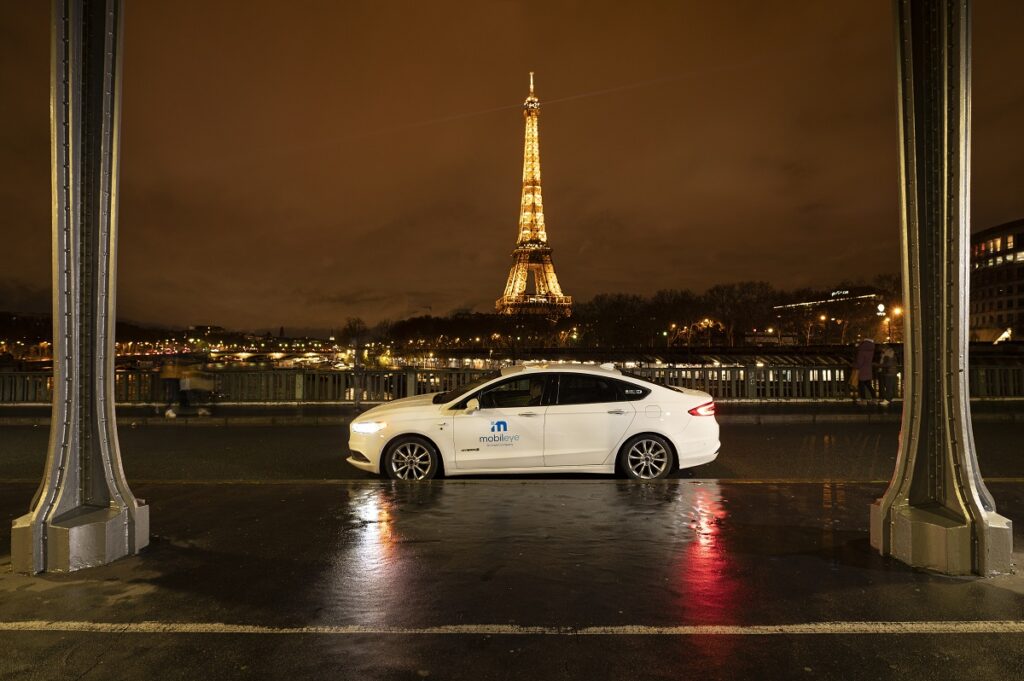Israel’s Mobileye, a developer of driver assistance technologies acquired by Intel Corporation for $15.3 billion in 2017, announced on Thursday it is launching a pilot for on-demand, autonomous car rides in Paris with French public transport company, RATP Group, the world’s third-largest public transportation operator.
The Jerusalem-based firm will add Paris to the list of cities where it is conducting ongoing pilots for its self-driving technology. Those cities include New York City, Detroit, Tokyo, Jerusalem, and Tel Aviv, and Munich, where Mobileye will launch autonomous “robotaxis” next year.
Mobileye has received an AV testing permit to allow the company to drive its autonomous robotaxis on the streets of Paris.
“Autonomous driving on the streets of Paris is another milestone on the way to realizing our vision of mass mobility with autonomous driving. We are pleased not only that we have received a permit to test the technology, but we have also been granted strong partners in Paris,” said Johann Jungwirth, vice president of Mobility-As-A-Service (MaaS) at Mobileye.
Riders who participate in the pilot will be able to ride in a Mobileye AV (autonomous vehicle) by using the Moovit smartphone app, which was developed for a consumer ridesharing service with Mobileye. Israeli smart transit data firm Moovit was acquired by Intel last year for $900 million.
In collaboration with RATP Group, employees of the Galeries Lafayette, the high-end French department store chain, will be able to use the service by requesting or scheduling a ride to work at the Haussmann Boulevard store in Paris using the Moovit app four days a week.

“Urban mobility is an integral part of today’s issues and must enable us to meet the challenges of a sustainable city,” said Alexander Liot, director of Galeries Lafayette Haussmann. “Paris continues to be an attraction. Therefore, as the leading department store in France, we are proud to join forces with Mobileye and the RATP Group to participate in this innovative project that reflects tomorrow’s transportation.
“This is an opportunity for the RATP Group to test a new use case, an autonomous car service for companies, but also to test the vehicle’s autonomous technology for possible integration on other transport modes such as a bus or minibus,” said Côme Berbain, director of Innovation for RATP Group.
The news comes a week after Intel announced it would take Mobileye public in 2022 in a deal that could value the Israeli unit at more than $50 billion. Intel acquired Mobileye in 2017 for a whopping $15.3 billion, Israel’s largest deal ever at the time,
Mobileye was founded in 1999 and went public in 2014 on the New York Stock Exchange (NYSE), before being acquired by Intel. The company has scaled autonomous vehicles (AV) test programs across multiple cities around the world, among other projects, and unveiled its production robotaxi. The company has also secured multiple deals for mobility-as-a-service (MaaS) programs in 2023 and consumer and business-to-business vehicle production designs or its self-driving system in 2024.
Sign up for our free weekly newsletter
Subscribe
The move “will unlock the value of Mobileye for Intel shareholders by creating a separate publicly traded company and will build on Mobileye’s successful track record and serve its expanded market,” Intel said in a statement.
Intel also said it will remain the majority owner of Mobileye and that the two companies will continue as strategic partners, where they will collaborate on projects as they pursue the growth of computing in the automotive sector. The executive team at Mobileye will remain the same, with Prof. Amnon Shashua to continue as the company’s CEO.
“Mobileye has realized accelerated growth and opportunity since joining the Intel family, nearly tripling annual chip shipments, revenue, and the number of employees since the acquisition,” said Amnon Shashua, founder and CEO of Mobileye. “Our alignment with Intel continues to provide Mobileye with valuable technical resources and support that has yielded strong revenue along with free cash flow that allows us to fund our AV development work from current revenue. Intel and Mobileye’s ongoing technology co-development will continue to deliver great platform solutions for our customers.”
Mobileye’s EyeQ
This month, Mobileye announced that it has recently shipped its 100 millionth EyeQ system-on-chip (SoC), the device that the company calls “the brains behind modern advanced driver-assistance systems (ADAS).”
Mobileye’s EyeQ chip is built from an application-driven approach to deliver advanced mobility solutions. EyeQ camera-based detection technologies can be used for features such as collision warning and vehicle, pedestrian, and cyclist detection. Mobileye launched its first-generation EyeQ in 2004. Today, it is a fifth-generation chip. More than 30 of the world’s leading automakers have partnered with Mobileye to use the chip, including Tesla, Volvo, General Motors, and Ford.
Last year, Mobileye signed a deal with US automaker Ford Motor to offer next-generation driver-assistance systems across Ford’s global product lineup. Mobileye said will provide its suite of EyeQ sensing technology to support available Ford Co-Pilot360 Technology driver-assist features like forward collision warning and cyclist detection.

Mobileye’s technology will support features such as Lane-Keeping System, Auto High-Beam headlamps, Pre-Collision Assist with Automatic Emergency Braking and Intelligent Adaptive Cruise Control, as well as Active Drive Assist hands-free driving coming to the all-new Mustang Mach-E and all-new F-150.
In addition to the EyeQ family of devices, Mobileye will also provide vision-processing software to support Level 1 and Level 2 driver-assistance systems in Ford vehicles globally.
Ford said it will take advantage of Mobileye’s technology throughout the lifecycle of its next-generation production vehicles, including F-150 and Mustang Mach-E, as well as future products that offer advanced driver-assistance systems features.
Related posts

Editors’ & Readers’ Choice: 10 Favorite NoCamels Articles

Forward Facing: What Does The Future Hold For Israeli High-Tech?

Impact Innovation: Israeli Startups That Could Shape Our Future




Facebook comments